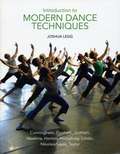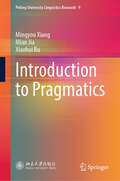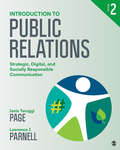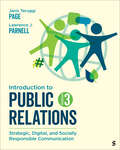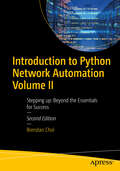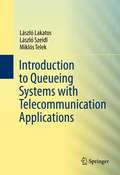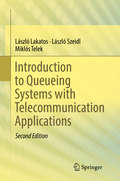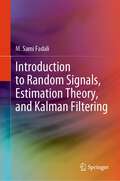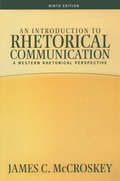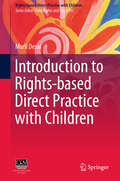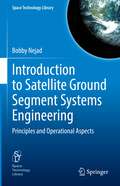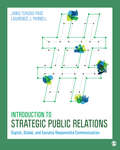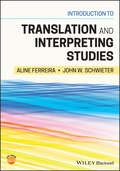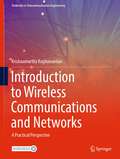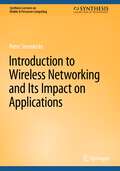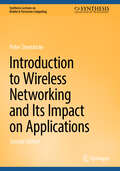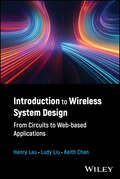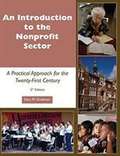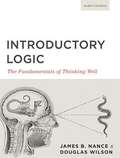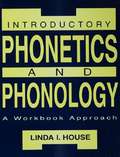- Table View
- List View
Introduction to Modern Dance Techniques
by Joshua LeggBringing together all of the major modern dance techniques from the last 80 years, this engaging account is the first of its kind. The informative discussion starts by mapping the historical development of modern dance: in the late 19th century, a new dance emerged--not yet known as modern dance--that rejected social strictures and ballet as well. With insight into the personalities and purposes of modern dance's vanguard--including Martha Graham, Lester Horton, José Limón, and Merce Cunningham--this compilation provides a comparative approach that will enable students to discern which technique best suits them and dispel the idea that there is a single, universal modern dance technique. There are also ideas for experimentation so that students can begin developing an aesthetic sense for not only what is pleasing to their artistic eye, but also for what technical ideas are exciting while their own body is in motion. Sample lessons are included for teachers to incorporate the text into courses.
Introduction to Pragmatics (Peking University Linguistics Research #9)
by Mingyou Xiang Mian Jia Xiaohui BuThis book covers major topics in the Anglo-American tradition, including deixis, presupposition, implicature, speech acts, and (im)politeness. These key topics are illustrated with examples and case studies from various contexts such as romantic relationships, online forums, social media posts, and popular culture. The book also includes a methods chapter that offers a hands-on guide for literature search, data collection, and data analysis. This book is particularly suitable for readers who have no prior knowledge of pragmatics.
Introduction to Public Relations: Strategic, Digital, and Socially Responsible Communication
by Janis Teruggi Page Lawrence J. ParnellIntroduction to Public Relations: Strategic, Digital, and Socially Responsible Communication presents a comprehensive introduction to the field of public relations (PR) with a focus on new media and social responsibility. Recognizing that the shifts in technology, business, and culture require a fresh approach, authors Janis Teruggi Page and Lawrence J. Parnell show students how today′s PR professionals create persuasive messages with modern technologies while working in line with the industry′s foundations. The authors balance this approach with a focus on understanding communication theory, history, process, and practice, and how all these concepts can be applied to strategic PR planning. The Second Edition features new and refreshed content throughout, including cases, chapter-opening scenarios, and profiles of both young and senior practitioners with tips and career guidance for student success. Included with this title: The password-protected Instructor Resource Site (formally known as SAGE Edge) offers access to all text-specific resources, including a test bank and editable, chapter-specific PowerPoint® slides.
Introduction to Public Relations: Strategic, Digital, and Socially Responsible Communication
by Janis Teruggi Page Lawrence J. ParnellIntroduction to Public Relations: Strategic, Digital, and Socially Responsible Communication presents a comprehensive introduction to the field of public relations (PR) with a focus on new media and social responsibility. Recognizing that the shifts in technology, business, and culture require a fresh approach, authors Janis Teruggi Page and Lawrence J. Parnell show students how today′s PR professionals create persuasive messages with modern technologies while working in line with the industry′s foundations. The authors balance this approach with a focus on understanding communication theory, history, process, and practice, and how all these concepts can be applied to strategic PR planning. The Second Edition features new and refreshed content throughout, including cases, chapter-opening scenarios, and profiles of both young and senior practitioners with tips and career guidance for student success. Included with this title: The password-protected Instructor Resource Site (formally known as SAGE Edge) offers access to all text-specific resources, including a test bank and editable, chapter-specific PowerPoint® slides.
Introduction to Public Relations: Strategic, Digital, and Socially Responsible Communication
by Janis Teruggi Page Lawrence J. ParnellIntroduction to Public Relations: Strategic, Digital, and Socially Responsible Communication presents a comprehensive introduction to the field of public relations, examining its current practices and future directions. In response to the dynamic shifts in technology, business, and culture, authors Janis T. Page and Lawrence J. Parnell illustrate how today’s PR professionals craft persuasive messages using modern technologies while working in line with the industry′s foundations. The text skillfully balances this approach by delving into communication theory, history, processes, and practices, demonstrating how these elements can be integrated into strategic public relations planning. Page and Parnell guide students toward becoming socially responsible communicators, where fostering trust and respect with diverse communities is valued over creating the next viral campaign. The Third Edition responds to the rising focus on social responsibility, sustainability, CEO and investor activism, and consumer demand for ethical brands, and addresses these changes with updated content, including new features, recent examples, case studies, and chapter-opening scenarios.
Introduction to Public Relations: Strategic, Digital, and Socially Responsible Communication
by Janis Teruggi Page Lawrence J. ParnellIntroduction to Public Relations: Strategic, Digital, and Socially Responsible Communication presents a comprehensive introduction to the field of public relations, examining its current practices and future directions. In response to the dynamic shifts in technology, business, and culture, authors Janis T. Page and Lawrence J. Parnell illustrate how today’s PR professionals craft persuasive messages using modern technologies while working in line with the industry′s foundations. The text skillfully balances this approach by delving into communication theory, history, processes, and practices, demonstrating how these elements can be integrated into strategic public relations planning. Page and Parnell guide students toward becoming socially responsible communicators, where fostering trust and respect with diverse communities is valued over creating the next viral campaign. The Third Edition responds to the rising focus on social responsibility, sustainability, CEO and investor activism, and consumer demand for ethical brands, and addresses these changes with updated content, including new features, recent examples, case studies, and chapter-opening scenarios.
Introduction to Python Network Automation Volume II: Stepping up: Beyond the Essentials for Success
by Brendan ChoiContinue your Python network automation journey and delve deeper into advanced techniques and methodologies. Volume 2 of this comprehensive guide takes you beyond the essentials, equipping you with advanced skills and strategies crucial for success in network automation. Building upon the knowledge gained in Volume 1, you’ll set the stage for mastery in this dynamic field. You’ll start by establishing a robust lab environment for advanced automation projects tailored to your needs and use practical exercises to gain valuable insights into essential networking protocols. Then automate repetitive tasks with precision and efficiency by leveraging powerful Python libraries and tools. You’ll also see how to streamline IP address management and data center infrastructure management tasks with Python. Discover advanced techniques for network management and monitoring to optimize network performance and security. Explore the development of custom tools and applications for Cisco IOS upgrade tasks in complex network environments and put your skills to the test with real-world scenarios. All this is designed to solidify your expertise and confidence in network automation practices. Your network management capabilities will be enhanced with advanced tools, such as NetBox. Introduction to Python Network Automation Volume 2 - Stepping up provides a comprehensive roadmap to elevate your skills and excel in the dynamic field of network automation. Whether you're a seasoned professional or a newcomer to the field, this guide equips you with the tools and knowledge needed to thrive in today's network automation landscape. What You Will Learn Apply Python fundamentals and network automation strategies effectively. Utilize Python for streamlined network administration, boosting productivity. Consolidate Linux fundamentals and IP network services for enhanced network management. Practice implementing regular expressions in Python for network application development. Develop working Cisco IOS upgrading Python application in PoC environment. Explore Python's extensive applications in enterprise network automation for versatile solutions. Who This Book Is For IT engineers and developers, network managers and students, who would like to learn network automation using Python.
Introduction to Queueing Systems with Telecommunication Applications
by Laszlo Lakatos Miklos Telek Laszlo SzeidlThe book is composed of two main parts: mathematical background and queueing systems with applications. The mathematical background is a self containing introduction to the stochastic processes of the later studies queueing systems. It starts with a quick introduction to probability theory and stochastic processes and continues with chapters on Markov chains and regenerative processes. More recent advances of queueing systems are based on phase type distributions, Markov arrival processes and quasy birth death processes, which are introduced in the last chapter of the first part. The second part is devoted to queueing models and their applications. After the introduction of the basic Markovian (from M/M/1 to M/M/1//N) and non-Markovian (M/G/1, G/M/1) queueing systems, a chapter presents the analysis of queues with phase type distributions, Markov arrival processes (from PH/M/1 to MAP/PH/1/K). The next chapter presents the classical queueing network results and the rest of this part is devoted to the application examples. There are queueing models for bandwidth charing with different traffic classes, slotted multiplexers, ATM switches, media access protocols like Aloha and IEEE 802.11b, priority systems and retrial systems. An appendix supplements the technical content with Laplace and z transformation rules, Bessel functions and a list of notations. The book contains examples and exercises throughout and could be used for graduate students in engineering, mathematics and sciences.
Introduction to Queueing Systems with Telecommunication Applications
by László Lakatos László Szeidl Miklós TelekThe book is the extended and revised version of the 1st edition and is composed of two main parts: mathematical background and queueing systems with applications. The mathematical background is a self-containing introduction to the stochastic processes of the later studied queueing systems. It starts with a quick introduction to probability theory and stochastic processes and continues with chapters on Markov chains and regenerative processes. More recent advances of queueing systems are based on phase type distributions, Markov arrival processes and quasy birth death processes, which are introduced in the last chapter of the first part.The second part is devoted to queueing models and their applications. After the introduction of the basic Markovian (from M/M/1 to M/M/1//N) and non-Markovian (M/G/1, G/M/1) queueing systems, a chapter presents the analysis of queues with phase type distributions, Markov arrival processes (from PH/M/1 to MAP/PH/1/K). The next chapter presents the classical queueing network results and the rest of this part is devoted to the application examples. There are queueing models for bandwidth charing with different traffic classes, slotted multiplexers, media access protocols like Aloha and IEEE 802.11b, priority systems and retrial systems.An appendix supplements the technical content with Laplace and z transformation rules, Bessel functions and a list of notations. The book contains examples and exercises throughout and could be used for graduate students in engineering, mathematics and sciences.Reviews of first edition:"The organization of the book is such that queueing models are viewed as special cases of more general stochastic processes, such as birth-death or semi-Markov processes. … this book is a valuable addition to the queuing literature and provides instructors with a viable alternative for a textbook to be used in a one- or two-semester course on queueing models, at the upper undergraduate or beginning graduate levels."Charles Knessl, SIAM Review, Vol. 56 (1), March, 2014
Introduction to Random Signals, Estimation Theory, and Kalman Filtering
by M. Sami FadaliThis book provides first-year graduate engineering students and practicing engineers with a solid introduction to random signals and estimation. It includes a statistical background that is often omitted in other textbooks but is essential for a clear understanding of estimators and their properties. The book emphasizes applicability rather than mathematical theory. It includes many examples and exercises to demonstrate and learn the theory that makes extensive use of MATLAB and its toolboxes. Although there are several excellent books on random signals and Kalman filtering, this book fulfills the need for a book that is suitable for a single-semester course that covers both random signals and Kalman filters and is used for a two-semester course for students that need remedial background. For students interested in more advanced studies in the area, the book provides a bridge between typical undergraduate engineering education and more advanced graduate-level courses.
Introduction to Rhetorical Communication
by James C MccroskeyAn Introduction to Rhetorical Communication offers a true integration of rhetorical theory and social science approaches to public communication. This highly successful text guides students through message planning and presentation in an easy step-by-step process. An Introduction to Rhetorical Communication provides students with a solid grounding in the rhetorical tradition and the basis for developing effective messages.
Introduction to Rights-based Direct Practice with Children
by Murli DesaiThe Sourcebook introduces the theoretical and ideological foundation and methodological basis of Rights-based Direct Practice with Children. It starts with the methodology of participatory group workshops to facilitate learning of the content. The content draws linkages among the foundation of life skills; psychosocial, sociological and critical theories of childhood; and child rights values, categories and principles; with the approaches, methods and skills of direct practice with children. The book takes examples from India but makes significant contribution to training and reference material for child rights teachers, trainers, facilitators and field workers, across the world, especially in the developing countries.
Introduction to Satellite Ground Segment Systems Engineering: Principles and Operational Aspects (Space Technology Library #41)
by Bobby NejadThe ground segment is the fundamental backbone of every satellite project, yet it is usually not visible to the public or the end user of a satellite service. Also the bulk of existing published space literature tends to focus on the satellite or its subsystems. This book tries to fill this gap and addresses systems engineering concepts applied to the design, development, qualification, and deployment of the ground control segment required to operate a single satellite, a constellation, or even a manned space vehicle. The domain of ground segment engineering has significantly evolved in recent years, mainly driven by major advances in the IT sector. Hardware virtualisation or the availability of on-demand cloud computing services are typical examples of new technologies that have changed fundamental architectural concepts previously standard in heritage ground segments. Furthermore, the stark increase of cyber attacks - today a major risk to almost all critical IT based infrastructure - has made a cyber threat resilient architecture to become one of the indispensable design requirements for ground segment engineers. The new mega constellations recently put into space deploying up to several hundred of flying objects have put very demanding needs on the ground segment for automated satellite operations. These topics and more are addressed in the book’s chapters, along with a detailed explanation of the most relevant components of a typical ground segment architecture. The basic functional requirements, design features, and the most important ground and space segment interfaces are addressed and explained in detail, supported by a wealth of figures for easier understanding. This book is kept at an introductory level, allowing newcomers to get familiar with this fairly complex subject matter. It is therefore suitable for graduate students, but can equally serve as a valuable source of information for already experienced space engineers who seek to gain a deeper understanding of the ground segment infrastructure and related systems engineering processes. It can also help project managers to better interact with their systems engineers, satellite developers to define their ground segment interfaces, and satellite operators to improve their flight and ground procedures. It is very well suited for everyone intending to start a career in satellite ground segment systems engineering.
Introduction to Semiconductor Lasers for Optical Communications
by David J. KlotzkinThis textbook provides a thorough and accessible treatment of semiconductor lasers from a design and engineering perspective. It includes both the physics of devices as well as the engineering, designing and testing of practical lasers. The material is presented clearly with many examples provided. Readers of the book will come to understand the finer aspects of the theory, design, fabrication and test of these devices and have an excellent background for further study of optoelectronics. This book also: Provides a multi-faceted approach to explaining the theories behind semiconductor lasers, utilizing mathematical examples, illustrations and written theoretical presentations Offers a balance of relevant optoelectronic topics, with specific attention given to distributed feedback lasers, growth techniques and waveguide cavity design Provides a summary of every chapter, worked examples, and problems for readers to solve Incorporates and explains recent breakthroughs in laser design
Introduction to Semiconductor Lasers for Optical Communications: An Applied Approach
by David J. KlotzkinThis updated, second edition textbook provides a thorough and accessible treatment of semiconductor lasers from a design and engineering perspective. It includes both the physics of devices as well as the engineering, designing and testing of practical lasers. The material is presented clearly with many examples provided. Readers of the book will come to understand the finer aspects of the theory, design, fabrication and test of these devices and have an excellent background for further study of optoelectronics.
Introduction to Strategic Public Relations: Digital, Global, and Socially Responsible Communication
by Janis Teruggi Page Lawrence J. ParnellHow can public relations play a more active role in the betterment of society? Introduction to Strategic Public Relations: Digital, Global, and Socially Responsible Communication prepares you for success in today’s fast-changing PR environment. Recognizing that developments in technology, business, and culture require a fresh approach, Janis T. Page and Lawrence Parnell have written a practical introductory text that aligns these shifts with the body of knowledge from which the discipline of public relations was built. Because the practice of public relations is rooted in credibility, the authors believe that you must become ethical and socially responsible communicators more concerned with building trust and respect with diverse communities than with creating throwaway content. The authors balance this approach with a focus on communication theory, history, process, and practice and on understanding how these apply to strategic public relations planning, as well as on learning how to create a believable and persuasive message. Key Features Chapter-opening Scenarios capture your attention by discussing current PR challenges—such as the Wells Fargo cross-selling, VW emissions cover-up, and P&G’s “Like a Girl” campaign—and thus frame the chapter content and encourage active reading. At the end of the chapter, you explore various aspects of socially responsible communication to “solve” the PR challenge. Socially Responsible Case Studies in each chapter illustrate the key responsibilities of a modern public relations professional such as media relations, crisis communications, employee communications, applied communications research, and corporate and government-specific communications. Each case features problem-solving questions to encourage critical thinking. Social Responsibility in Action boxes feature short, specific social responsibility cases—such as Universals’ #NoFoodWasted, Nespresso in South Sudan, and Merck’s collaboration with AIDS activists—to highlight best practices and effective tactics, showing the link between sound public relations strategy and meaningful social responsibility programs. Insight boxes spark classroom discussion on particularly important or unique topics in each chapter. Personality Profile boxes will inspire you with stories from PR veterans and rising stars such as the U.S. CEO of Burson-Marstellor, the Chief Communication Officer of the United Nations Foundation, and the Executive VP at HavasPR.
Introduction to Strategic Public Relations: Digital, Global, and Socially Responsible Communication
by Janis Teruggi Page Lawrence J. ParnellHow can public relations play a more active role in the betterment of society? Introduction to Strategic Public Relations: Digital, Global, and Socially Responsible Communication prepares you for success in today’s fast-changing PR environment. Recognizing that developments in technology, business, and culture require a fresh approach, Janis T. Page and Lawrence Parnell have written a practical introductory text that aligns these shifts with the body of knowledge from which the discipline of public relations was built. Because the practice of public relations is rooted in credibility, the authors believe that you must become ethical and socially responsible communicators more concerned with building trust and respect with diverse communities than with creating throwaway content. The authors balance this approach with a focus on communication theory, history, process, and practice and on understanding how these apply to strategic public relations planning, as well as on learning how to create a believable and persuasive message. Key Features Chapter-opening Scenarios capture your attention by discussing current PR challenges—such as the Wells Fargo cross-selling, VW emissions cover-up, and P&G’s “Like a Girl” campaign—and thus frame the chapter content and encourage active reading. At the end of the chapter, you explore various aspects of socially responsible communication to “solve” the PR challenge. Socially Responsible Case Studies in each chapter illustrate the key responsibilities of a modern public relations professional such as media relations, crisis communications, employee communications, applied communications research, and corporate and government-specific communications. Each case features problem-solving questions to encourage critical thinking. Social Responsibility in Action boxes feature short, specific social responsibility cases—such as Universals’ #NoFoodWasted, Nespresso in South Sudan, and Merck’s collaboration with AIDS activists—to highlight best practices and effective tactics, showing the link between sound public relations strategy and meaningful social responsibility programs. Insight boxes spark classroom discussion on particularly important or unique topics in each chapter. Personality Profile boxes will inspire you with stories from PR veterans and rising stars such as the U.S. CEO of Burson-Marstellor, the Chief Communication Officer of the United Nations Foundation, and the Executive VP at HavasPR.
Introduction to Translation and Interpreting Studies
by John W. Schwieter Aline FerreiraA unique and balanced combination of translation and interpreting studies, edited and written by leading voices in the fields In Introduction to Translation and Interpreting Studies, accomplished scholars Aline Ferreira and John W. Schwieter have brought together a detailed and comprehensive introductory-level textbook covering the essential aspects of translation and interpreting studies. Through chapters authored by leading voices in the field, this book covers topics of theoretical and conceptual relevance—such as the history of the development of the field and methods for understanding gender, society, and culture as aspects of the role of the interpreter—as well as critical topics in the application of theory to real world practice. Beginning with an authoritative treatment of the theoretical developments that have defined the field since the early 1970s, this textbook first describes the influential work of such figures as Jakobson, Holmes, and Toury, thus ensuring students develop a thorough understanding of the history and theoretical underpinnings of the fields of translation and interpreting studies. The text then begins to introduce grounded discussions of interpreting in specialized fields such as legal and healthcare interpreting and sign language translation. Learning is reinforced throughout the text through pedagogical features including reflection questions, highlighted key words, further readings, and chapter objectives. Instructors will also have access to companion website with PowerPoint slides and multiple-choice questions to support classroom application. Truly a unique work in translation and interpreting studies, this essential new textbook offers: A thorough introduction to the fields of translation and interpreting with discussion of applications to interdisciplinary topics Explorations of translation machines and technology, including their history and recent trends Practical discussions of culture, gender, and society in the context of translation and interpreting studies, as well as training and pedagogical issues in translation and interpreting A concise examination of translation process research and methods, including the mental processes and actions that people take while translating Complementary web materials including PowerPoint slides and practice questionsIdeal for advanced undergraduate and graduate students in programs in such as linguistics, language studies, and communications, or for those who plan to work in translation and/or interpreting, Introduction to Translation and Interpreting Studies will earn a place in the libraries of anyone interested in a reader-friendly translation and interpreting resource.
Introduction to Wireless Communications and Networks: A Practical Perspective (Textbooks in Telecommunication Engineering)
by Krishnamurthy RaghunandanThis book provides an intuitive and accessible introduction to the fundamentals of wireless communications and their tremendous impact on nearly every aspect of our lives. The author starts with basic information on physics and mathematics and then expands on it, helping readers understand fundamental concepts of RF systems and how they are designed. Covering diverse topics in wireless communication systems, including cellular and personal devices, satellite and space communication networks, telecommunication regulation, standardization and safety, the book combines theory and practice using problems from industry, and includes examples of day-to-day work in the field. It is divided into two parts – basic (fundamentals) and advanced (elected topics). Drawing on the author’s extensive training and industry experience in standards, public safety and regulations, the book includes information on what checks and balances are used by wireless engineers around the globe and address questions concerning safety, reliability and long-term operation. A full suite of classroom information is included.
Introduction to Wireless Networking and Its Impact on Applications (Synthesis Lectures on Mobile & Pervasive Computing)
by Peter SteenkisteThis book teaches readers how wireless networks work, why some of their properties impact wireless network performance at the application level, and what both network engineers and application developers can do to cope with these challenges. Internet users increasingly rely on wireless access links for diverse tasks such as web browsing, video conferencing, interactive games, and data sharing. Irrespective of how they access the Internet, they expect good performance and a high quality of experience. Unfortunately, wireless access networks are much more challenging to build than wired networks. In wired networks, signals used for communication are contained in a carefully engineered transmission medium. In contrast, wireless signals travel in our physical environment, where the presence of obstacles, interference, and mobility can affect communication. In addition, network performance can differ significantly across physical environments. As a result, the performance of wireless links is often lower and less predictable than that of wired links. The author structured the book according to the layers in the Internet protocol stack, similar to traditional network books. However, rather than presenting a general description of each layer, the focus is on wireless networks and how they differ from wired networks.
Introduction to Wireless Networking and Its Impact on Applications (Synthesis Lectures on Mobile & Pervasive Computing)
by Peter SteenkisteThis book teaches readers how wireless networks work, why some of their properties impact wireless network performance at the application level, and what both network engineers and application developers can do to cope with these challenges. This Second Edition includes key updates on these topics, which have become increasingly important as internet users rely more and more on wireless access links for diverse tasks such as web browsing, video conferencing, interactive games, and data sharing. The author compares and contrasts wireless and wired networks, explaining that users expect high quality performance regardless of how they access the internet, even though wireless networks are much more difficult to build than wired networks. Structured according to the layers in the Internet protocol stack, the book discusses the challenges involved in building wireless networks and the obstacles that can affect their performance in real-world applications. The author also provides strategies for approaching these challenges and obstacles. This Second Edition incorporates new information on several topics, including WiFi and 5G cellular.
Introduction to Wireless System Design: From Circuits to Web-based Applications
by Keith Chan Henry Lau Ludy LiuTechnical insights on the vital aspects of hardware and software components in modern wireless system design Introduction to Wireless System Design: From Circuits to Web-based Applications provides an introductory level overview for readers to acquire technical insights on the most important aspects of modern wireless system design from an industrial and practical perspective. Various functional blocks of wireless systems and products are discussed and analyzed with practical examples of commercial products. Software development is addressed to provide a comprehensive understanding of the development of complete wireless systems. The book concludes by presenting practical design examples followed by future trends. Core topics covered in this book include wireless standards for GPS, Bluetooth, cellular, Wi-Fi, Zigbee, LoRaWAN, Sigfox, and NBIoT; major transmitter issues including power gain, power efficiency, harmonic prevention, and suppression; and server software development for building dynamic web interfaces using HTML, CSS, and JavaScript. Written by three highly qualified authors, the book also includes information on: System characteristics of hardware receivers, including noise temperature, bandwidth, figure, and sensitivity Components of circuit blocks in hardware transmitters, including oscillator, modulator, buffer amplifier, frequency multiplier, power amplifier, output filter Types of antennas, including dipole, monopole, loop, beam-forming, and miniature designs like patch, inverted-L, inverted-F, and meandered line Elements of software architecture design, including user interface, data and sequence flow, and timing diagrams Smartphone application software development, with insight on tools such as Android Studio, Flutter, React, and Swift Introduction to Wireless System Design: From Circuits to Web-based Applications is a highly practical and actionable resource on the subject for practicing engineers and programmers, as well as graduate and undergraduate students in related programs of study.
Introduction to the Nonprofit Sector: A Practical Approach for the Twenty-first Century
by Gary M. GrobmanThis is an introductory text on the nonprofit sector and nonprofit organizations. It provides an overview of the history, theory, and scope of the nonprofit sector. It discusses issues facing nonprofits, such as legal and regulatory issues, ethics, quality, fiscal, and liability issues. It also provides practical guidelines for writing mission and vision statements, strategic planning, hiring, firing, lobbying, communicating, using the Internet, and other functions of nonprofit organizations. Each chapter includes a synopsis at the beginning, as well as discussion questions, activities, and bibliographic references at the end. An index is included.
Introductory Logic:The Fundamentals of Thinking Well (5th Edition.)
by Douglas Wilson James B. NanceThis book intends to help students in establishing a concrete and applicable knowledge of propositional arguments.
Introductory Phonetics and Phonology: A Workbook Approach
by Linda I. HouseSuccess in mastering any language requires knowledge in speaking, reading, and writing the language. The speaking component requires the understanding and use of correct pronunciation, emphasis, and syntactic patterns. The written component requires mastery of the alphabet, spelling, and the ability to write, print, or type the pattern. Very early in the learning process, speakers of the English language become keenly aware of the language's lack of sound to symbol correspondence. To help speech/language researchers, media personnel, individuals learning English as a second language, and others interested in correct pronunciation, the International Phonetic Alphabet (IPA) was devised. Extensively class tested, this book offers a practical understanding approach to phonetics and the IPA in a workbook format. It will be welcomed by professionals, students, and trainees in the fields of communication science, communication disorders, speech pathology, and linguistics.
